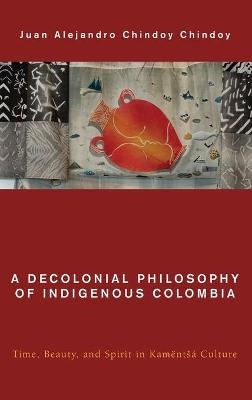
A Decolonial Philosophy of Indigenous Colombia
Rowman & Littlefield International (Verlag)
978-1-78661-629-6 (ISBN)
The author, raised within Kamëntšá Culture, weaves personal experience with philosophical insights and significance of the Kamentsa culture, presented through its own frameworks and narratives. The philosophical dimensions of Kamentsa culture are articulated and contextualized within a legacy of colonial domination by long-term Spanish and Catholic rule that enacts the necessary separation of Kamentsa ideas from their representations through Catholic hermeneutic approaches. However, the book also embraces intercultural philosophical engagement, as the methodological approach is formed partly through some modern and contemporary Western thinkers as well as indigenous writers and figures like Carlos Tamabioy and N. Scott Momaday.
Juan Alejandro Chindoy Chindoy is Lecturer in Moral and Political Philosophy at Caldas University, Manizales, Colombia and Lecturer in Philosophy of Law and Hermeneutics at Universidad Católica Luis Amigó, Manizales, Colombia.
Introduction
Generalities of Kamëntšá Culture
A Philosophical Approach to Kamëntšá Culture
Chapter 1 – Time in Kamëntšá Culture
Two Conceptions of Time
Time as History
Sibundoy at the Time of the Early Spanish Conquistadors
Carlos Tamabioy’s Legacy in Land Ownership
Capuchin Missionaries and the Division of Land in the Sibundoy Valley
Time as Primary Experience
Storytelling as Constituted Symbol
Scholarship on Storytelling as Constituted Symbol
Storytelling as Constituting Symbol
Conclusion
Chapter 2 – Beauty in Kamëntšá Culture
Bëtskanté as Constituted Symbol
From Bëtsknaté to Clestrinӱë
Bëtsknaté as a Constituting Symbol: An Experience of Dancing
The Philosophical Significance of Kamëntšá Dancing
Conclusion
Chapter 3 – Spirit in Kamëntšá Culture
Native Doctors and Rituals of Healing: The Constituted Nature of Rituals
Scholarly Descriptions of Yajé
Yajé ceremonies in Sibundoy: The Constituting Aspects of Yajé
Conclusion
Conclusion
Bibliography
| Erscheinungsdatum | 30.06.2020 |
|---|---|
| Reihe/Serie | Global Critical Caribbean Thought |
| Verlagsort | London |
| Sprache | englisch |
| Maße | 163 x 231 mm |
| Gewicht | 367 g |
| Themenwelt | Sozialwissenschaften ► Ethnologie ► Völkerkunde (Naturvölker) |
| Sozialwissenschaften ► Soziologie | |
| ISBN-10 | 1-78661-629-7 / 1786616297 |
| ISBN-13 | 978-1-78661-629-6 / 9781786616296 |
| Zustand | Neuware |
| Haben Sie eine Frage zum Produkt? |
aus dem Bereich


